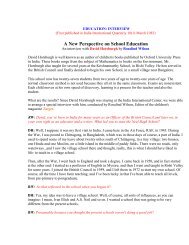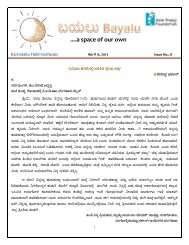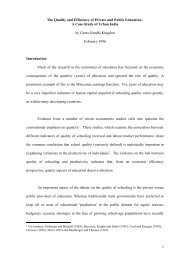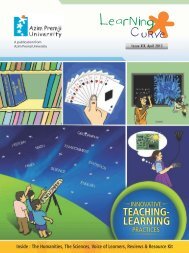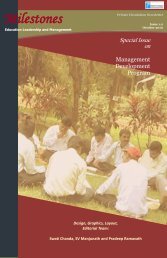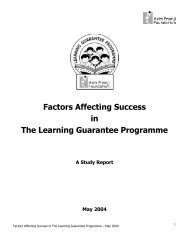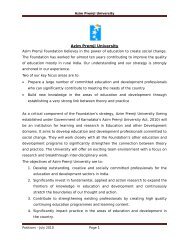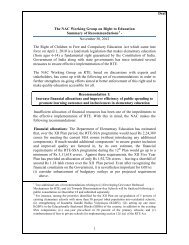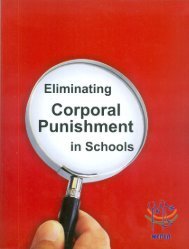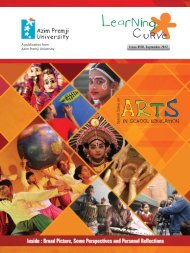Indesign Pagesnew.indd - Azim Premji Foundation
Indesign Pagesnew.indd - Azim Premji Foundation
Indesign Pagesnew.indd - Azim Premji Foundation
You also want an ePaper? Increase the reach of your titles
YUMPU automatically turns print PDFs into web optimized ePapers that Google loves.
and help them understand why and what was depicted.<br />
Is Activity Based Learning Possible in Social<br />
Sciences?<br />
The principle of using activities to help children internalize<br />
concepts is fairly well established in educational theory. After<br />
much experimentation, we identifi ed three major kinds of<br />
activities that could be conducted in simple but effective<br />
ways in the social science classroom.<br />
1. Interspersing questions in the text: The common<br />
practice in classrooms is to read the text from beginning<br />
to end. We broke up the text by introducing questions<br />
of many kinds; some were to aid children comprehend<br />
and understand diffi cult narrations, some helped extract<br />
information from maps, diagrams and illustrations,<br />
others were concept related, requiring the children to<br />
discuss among themselves to search for answers and<br />
there were comparative questions too – comparing two<br />
different periods to identify changes that had occurred,<br />
or pinpointing the differences between two situations.<br />
These questions encouraged discussions between the<br />
teacher and the students and, in looking for the answers,<br />
the children had no option but to study and comprehend<br />
the text as well.<br />
2.<br />
Using children’s experiences and knowledge:<br />
Children in the 10-15 year age-group are a storehouse of<br />
knowledge when it comes to their daily experiences and<br />
observations of the community they live in. Normally,<br />
this storehouse is overlooked in social science teaching<br />
but it has the potential of becoming a very practical and<br />
useful toolbox for learning. Many of the questions we<br />
posed in the text sought to delve into this storehouse of<br />
students’ experiences and relate to them in the context<br />
of learning.<br />
3. Exercises in using the textbook meaningfully: The<br />
ability to understand and express oneself through the<br />
medium of the written word is crucial. This is perhaps<br />
because it is not possible to directly experience other<br />
times, places, societies, organizations and cultures.<br />
One needs to read and learn about them, or listen to<br />
someone talk about them.<br />
We tried to develop writing skills in children by introducing<br />
different types of exercises in each chapter. We also sought<br />
to assess whether children had acquired such skills in the<br />
Section D<br />
Assessment of Social Science in Schools- Our Experiences, Experiments and Learnings<br />
examinations we conducted.<br />
In this context, we opted for the open-book examinations<br />
because we were clear in our minds that we were not<br />
judging the ability of a child to memorize the content of the<br />
textbook but instead wanted to test whether the child was<br />
able to think, understand and use the textbook intelligently.<br />
It is these abilities that we focused upon in the evaluation<br />
system we developed.<br />
Evaluation of Students: Open-book<br />
Examinations<br />
The open-book method of evaluation is important for<br />
the social sciences because it is meaningless to evaluate<br />
how much information on a particular topic a student has<br />
‘swallowed’. There is no limit to the quantum of such<br />
information. No curriculum can be expected to provide all<br />
the available information on a subject nor is it possible for<br />
children to remember it all. Whatever little they do remember<br />
or memorize for examinations is eventually forgotten.<br />
Does this mean that the information leaves no imprint<br />
on their minds and personality once it is forgotten? Isn’t<br />
education supposed to leave an imprint? Shouldn’t we<br />
retain the thinking, understanding and skills that education<br />
is supposed to develop? These are abilities that help us<br />
throughout our lives to face up to new situations, learn<br />
new things from books and other materials and solve new<br />
problems that constantly arise.<br />
Kamala Mukunda, a teacher and psychologist, cites an<br />
interesting study done in the USA in her book What Did<br />
You Ask At School Today? (2009, page 68). Harry Bahrick<br />
and colleagues sought to assess what high school students<br />
remembered 50 years after leaving school. They found the<br />
students tended to remember whatever they had studied<br />
over a long period of time and those things which they<br />
repeatedly used. They forgot what was taught for a short<br />
time or which they found little use for in later life.<br />
Mukunda draws our attention to the fact that we learn to<br />
read, write, understand, calculate, solve problems, analyze<br />
things, and reach conclusions in school. These are abilities we<br />
never lose throughout our lives, provided school education<br />
focuses on developing them in students.<br />
These were the aspects we emphasized on in our evaluation<br />
of student performance. Our examinations sought to assess<br />
whether children had acquired the ability to think, analyze,<br />
Pg No: 97



